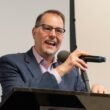Recently, Congress passed a budget resolution blueprint that could result in a reduction of $880 billion in Medicaid funding over the next 10 years. These potential cuts would have devastating impacts on more than 70 million people who rely on Medicaid nationally, including nearly four million New Yorkers.
As New York City’s acting health commissioner, I oversee the oldest and largest public health department in the country. We are the invisible shield that protects and promotes the health of all New Yorkers. We defend the wellness of more than 8 million residents, touching every aspect of their lives from birth to death.
To do so, we need a clear picture of health in New York and an understanding of the conditions that impact it. Our data shows a consistent correlation between higher poverty levels and worsened health outcomes, and we know Medicaid is a lifeline to keep New Yorkers out of poverty. New Yorkers who are insured (by Medicaid or otherwise) report better health than those who are not.
Every day, I see these trends play out across our city, and I know just how important Medicaid is at the population level. As an internal medicine doctor at Kings County Hospital in Brooklyn, I see just how high the stakes are at an individual level.
Ever since my first rotation during residency — where one of the first patients I took care of had cerebral malaria and almost died — I have been responsible for people’s lives at their most vulnerable moments. Every time I care for a patient, I am inherently asking them to trust me with their life.
I am acutely aware that trust cannot be given, it must be earned. And I cannot earn the trust of New York City residents — or the patients I see at Kings County, many of whom are on Medicaid — unless I do all I can to protect their health.
For 60 years, Medicaid has provided certainty that our most vulnerable Americans have access to health insurance. When millions of Americans lost their jobs and employer-sponsored health insurance during the COVID-19 pandemic, Medicaid ensured that they still had access to a doctor, saving thousands of lives.
Medicaid is the largest single provider of health insurance coverage in the U.S. and a widely popular program in our communities. Recent polling shows that nearly all (97%) adults say Medicaid is important for people in their local community, and three out of four adults are opposed to Medicaid spending cuts. More than 70 million Americans are currently enrolled in Medicaid.
Here in New York City, about half of the population is enrolled in Medicaid. That amounts to almost four million people, the majority of whom are children, older adults, and people with disabilities. In New York and across the country, most adults on Medicaid are either already working — usually in industries that don’t offer employer-sponsored health insurance — or have disabilities that prevent them from working. Fifty-five percent of the babies born in New York City each year are born to parents covered by Medicaid. This is not an ancillary issue — Medicaid is the bedrock of health care in New York.
Approximately $56 billion flows through New York City’s health care system to cover care for New Yorkers enrolled in the program. These dollars support private physicians, dentists, community health providers, public hospital systems, nursing homes, and home care providers. In turn, the health care system supports an ecosystem of local vendors, community-based organizations, and small businesses — which constitute 14% of the workforce. Medicaid funding bolsters the economic wellbeing of New York.
For people on Medicaid, retaining coverage also means economic security though affordable health care and lower out-of-pocket expenses.
Medicaid is one of the most effective anti-poverty programs in the United States. There is an intrinsic and undervalued connection between physical and financial health, and Medicaid is the largest federal program that recognizes that connection.
Research shows that enrollment in Medicaid has a greater impact on reducing child poverty than all other benefits programs combined. Similarly, enrollment in Medicaid significantly reduces medical debt for families, because it allows people to more readily access preventive care and covers out-of-pocket costs.
Funding Medicaid is a matter of lives and livelihoods. As New Yorkers, employees, and employers, we all benefit from Medicaid. If we are to earn the trust of our communities — as doctors, as public servants, or even as neighbors — all of us must urge Congress to keep Medicaid fully funded. For the health of our city, funding Medicaid is a lifeline.
Morse is the acting health commissioner of New York City.








